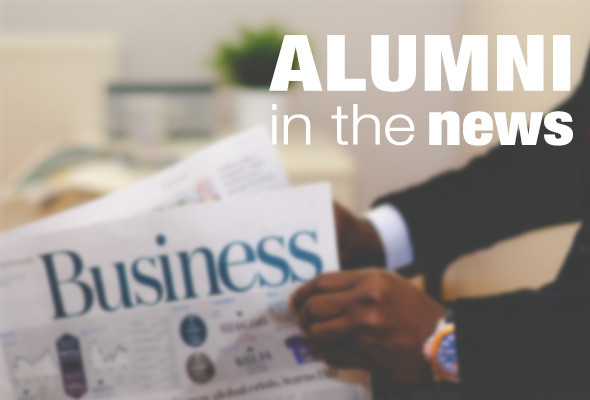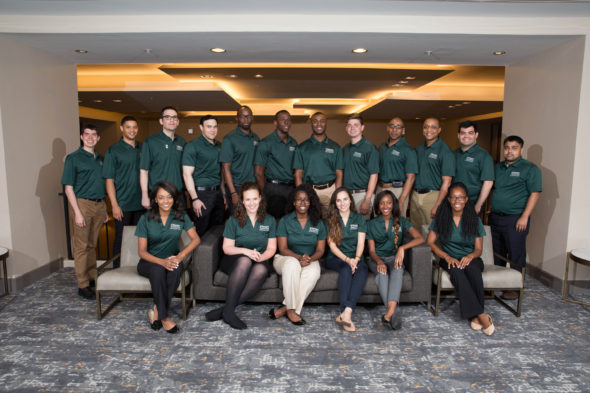Olin hosted its fall diversity weekend October 21-23. It was a unique opportunity to share the incredible opportunities offered by Olin’s full-time MBA program with students from across the nation. Prospective students received an introduction to the MBA program not only from an administrative level, but from the classroom, career search, and extracurricular levels.
Diversity weekend is a mini-immersion into the Olin community and experience.
The prospective students heard from Interim Dean Kurt Dirks and our Associate Dean and Director of Olin’s Graduate Programs, Joe Fox. Joe and Kurt are the most important administrators for the MBA program, and offered unique insights into some of Olin’s key competitive and unique advantages over other top tier programs. One of their recurrent themes was the unique value delivered by our relatively small cohort size. Kurt and Joe explained the ways in which this lends itself to our students having direct and meaningful relationships with Olin’s prestigious administrators and faculty.

To better demonstrate Olin’s commitment to excellent instruction, our prospective students had the pleasure of working through a classic business school case study with our very own Professor Sergio Chayet. Sergio, who teaches our core operations course (along with a handful of elective courses), is one of our most-loved faculty members. He exemplifies Olin’s reputation for both brilliant and student-focused instructors.
Rounding out our exploration of the services provided by Olin itself, the Weston Career Center’s (WCC) Associate Director of Employee Relations, Annetta Culver, spoke with the Diversity Weekend attendees about the WCC’s broad base of job search support. Not only does the WCC bring some of the world’s most prestigious companies to campus, like Goldman Sachs, Accenture, and Amazon for recruiting events, but the WCC also helps prepare students for successful networking, application, and interview processes.
Outside of the classroom, Olin MBA students are able to get real-world business experience through our Center for Experiential Learning (CEL), which facilitates five different courses. These courses allow Olin students to get their hands dirty, solving real business problems in organizations spanning domestic and international Fortune 500s, small and growth-stage startups, along with nonprofits and community-focused organizations. The CEL hosted a reception and information session for our prospective students, and also served some of St. Louis’ world famous BBQ courtesy of Pappy’s Smokehouse.

As Olin is not just a part of the Washington University community, but also an integral part of the larger St. Louis community, the diversity weekend attendees heard from Leah Merrifield. Leah, who is WashU’s Vice Chancellor for Community Engagement, explained the myriad ways that Washington University contributes to and engages with St. Louis’ diverse communities. St. Louis, a healthcare and startup powerhouse that also struggles with deep-seated socioeconomic and racial segregation, is a unique place to attend business school. Leah spoke about the ways in which Olin’s students are able to work with, and learn from, both St. Louis’ incredible businesses and also its social challenges.
Continuing this theme, Natalie Clay, a St. Louis diversity and inclusion professional gave a rousing speech titled “What Harvard Business Review Knows-and-Missed About the Future of Diversity & Inclusion.” This thought-provoking speech encouraged students to explore the implications, and need for, diversity and inclusion efforts both in corporations and in business schools.
 Throughout the weekend’s programming, Diversity Weekends attendees were able to connect and ask questions to both current Olin MBAs, and some of our storied alumni. These interactions were a great way for the prospective students to learn about the Olin MBA experience directly from those who are currently living with it, and those who can speak to how Olin shaped their personal and professional lives with the benefit of retrospect.
Throughout the weekend’s programming, Diversity Weekends attendees were able to connect and ask questions to both current Olin MBAs, and some of our storied alumni. These interactions were a great way for the prospective students to learn about the Olin MBA experience directly from those who are currently living with it, and those who can speak to how Olin shaped their personal and professional lives with the benefit of retrospect.
Overall, Diversity Weekend was a condensed version of the Olin experience. We sincerely hope that all attendees enjoyed our programming, and if you would like to attend one of our future informational events, please don’t hesitate to reach out to our admissions office.
Guest Blogger: Alex Novelli, MBA’17; Diversity Weekend Co-Chair





 About CNA
About CNA





 Throughout the weekend’s programming, Diversity Weekends attendees were able to connect and ask questions to both current Olin MBAs, and some of our storied alumni. These interactions were a great way for the prospective students to learn about the Olin MBA experience directly from those who are currently living with it, and those who can speak to how Olin shaped their personal and professional lives with the benefit of retrospect.
Throughout the weekend’s programming, Diversity Weekends attendees were able to connect and ask questions to both current Olin MBAs, and some of our storied alumni. These interactions were a great way for the prospective students to learn about the Olin MBA experience directly from those who are currently living with it, and those who can speak to how Olin shaped their personal and professional lives with the benefit of retrospect.

